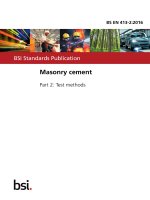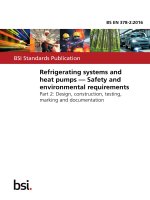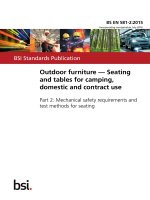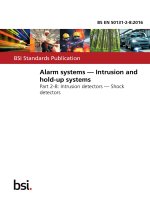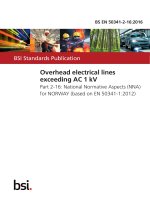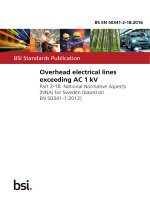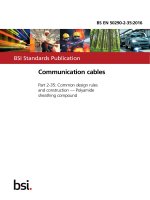Bsi bs en 61300 2 47 2016
Bạn đang xem bản rút gọn của tài liệu. Xem và tải ngay bản đầy đủ của tài liệu tại đây (2 MB, 16 trang )
BS EN 61300-2-47:2016
BSI Standards Publication
Fibre optic interconnecting
devices and passive
components — Basic
test and measurement
procedures
Part 2-47: Tests — Thermal shocks
BRITISH STANDARD
BS EN 61300-2-47:2016
National foreword
This British Standard is the UK implementation of EN 61300-2-47:2016. It
isidentical to IEC 61300-2-47:2016. It supersedes BS EN 61300-2-47:2010
which is withdrawn.
The UK participation in its preparation was entrusted by Technical
Committee GEL/86, Fibre optics, to Subcommittee GEL/86/2, Fibre optic
interconnecting devices and passive components.
A list of organizations represented on this committee can be obtained on
request to its secretary.
This publication does not purport to include all the necessary provisions of
a contract. Users are responsible for its correct application.
© The British Standards Institution 2016.
Published by BSI Standards Limited 2016
ISBN 978 0 580 86015 7
ICS 33.180.20
Compliance with a British Standard cannot confer immunity from
legal obligations.
This British Standard was published under the authority of the
Standards Policy and Strategy Committee on 30 September 2016.
Amendments/corrigenda issued since publication
Date
Text affected
BS EN 61300-2-47:2016
EUROPEAN STANDARD
EN 61300-2-47
NORME EUROPÉENNE
EUROPÄISCHE NORM
September 2016
ICS 33.180.20
Supersedes EN 61300-2-47:2010
English Version
Fibre optic interconnecting devices and passive components Basic test and measurement procedures - Part 2-47: Tests Thermal shocks
(IEC 61300-2-47:2016)
Dispositifs d'interconnexion et composants passifs
fibroniques - Procédures fondamentales d'essais et de
mesures - Partie 2-47: Essais - Chocs thermiques
(IEC 61300-2-47:2016)
Lichtwellenleiter - Verbindungselemente und passive
Bauteile - Grundlegende Prüf- und Messverfahren - Teil 247: Prüfungen - Temperaturschock
(IEC 61300-2-47:2016)
This European Standard was approved by CENELEC on 2016-06-23. CENELEC members are bound to comply with the CEN/CENELEC
Internal Regulations which stipulate the conditions for giving this European Standard the status of a national standard without any alteration.
Up-to-date lists and bibliographical references concerning such national standards may be obtained on application to the CEN-CENELEC
Management Centre or to any CENELEC member.
This European Standard exists in three official versions (English, French, German). A version in any other language made by translation
under the responsibility of a CENELEC member into its own language and notified to the CEN-CENELEC Management Centre has the
same status as the official versions.
CENELEC members are the national electrotechnical committees of Austria, Belgium, Bulgaria, Croatia, Cyprus, the Czech Republic,
Denmark, Estonia, Finland, Former Yugoslav Republic of Macedonia, France, Germany, Greece, Hungary, Iceland, Ireland, Italy, Latvia,
Lithuania, Luxembourg, Malta, the Netherlands, Norway, Poland, Portugal, Romania, Slovakia, Slovenia, Spain, Sweden, Switzerland,
Turkey and the United Kingdom.
European Committee for Electrotechnical Standardization
Comité Européen de Normalisation Electrotechnique
Europäisches Komitee für Elektrotechnische Normung
CEN-CENELEC Management Centre: Avenue Marnix 17, B-1000 Brussels
© 2016 CENELEC All rights of exploitation in any form and by any means reserved worldwide for CENELEC Members.
Ref. No. EN 61300-2-47:2016 E
BS EN 61300-2-47:2016
EN 61300-2-47:2016
European foreword
The text of document 86B/3879/CDV, future edition 4 of IEC 61300-2-47, prepared by SC 86B "Fibre
optic interconnecting devices and passive components" of IEC/TC 86 "Fibre optics" was submitted to
the IEC-CENELEC parallel vote and approved by CENELEC as EN 61300-2-47:2016.
The following dates are fixed:
•
latest date by which the document has to be implemented at
national level by publication of an identical national
standard or by endorsement
(dop)
2017-03-23
•
latest date by which the national standards conflicting with
the document have to be withdrawn
(dow)
2019-06-23
This document supersedes EN 61300-2-47:2010.
Attention is drawn to the possibility that some of the elements of this document may be the subject of
patent rights. CENELEC [and/or CEN] shall not be held responsible for identifying any or all such
patent rights.
Endorsement notice
The text of the International Standard IEC 61300-2-47:2016 was approved by CENELEC as a
European Standard without any modification.
In the official version, for Bibliography, the following note has to be added for the standard indicated:
IEC 61753-1
2
NOTE
Harmonized as EN 61753-1.
BS EN 61300-2-47:2016
EN 61300-2-47:2016
Annex ZA
(normative)
Normative references to international publications
with their corresponding European publications
The following documents, in whole or in part, are normatively referenced in this document and are
indispensable for its application. For dated references, only the edition cited applies. For undated
references, the latest edition of the referenced document (including any amendments) applies.
NOTE 1 When an International Publication has been modified by common modifications, indicated by (mod), the relevant
EN/HD applies.
NOTE 2 Up-to-date information on the latest versions of the European Standards listed in this annex is available here:
www.cenelec.eu.
Publication
IEC 60068-2-14
Year
-
IEC 61300-3-1
-
Title
EN/HD
Environmental testing -- Part 2-14: Tests -EN 60068-2-14
Test N: Change of temperature
Fibre optic interconnecting devices andEN 61300-3-1
passive components - Basic test and
measurement procedures -- Part 3-1:
Examinations and measurements - Visual
examination
Year
-
3
–2–
BS EN 61300-2-47:2016
IEC 61300-2-47:2016 © IEC 2016
CONTENTS
FOREWORD ......................................................................................................................... 3
1
Scope ............................................................................................................................ 5
2
Normative references..................................................................................................... 5
3
General description ....................................................................................................... 5
4
Apparatus ...................................................................................................................... 5
4.1
Testing chambers .................................................................................................. 5
4.2
Support for mounting the DUT ............................................................................... 6
5
Procedure ..................................................................................................................... 6
5.1
General ................................................................................................................. 6
5.2
Preconditioning ..................................................................................................... 6
5.3
Initial examination and measurement ..................................................................... 6
5.4
Testing ................................................................................................................. 6
5.5
Recovery .............................................................................................................. 7
5.6
Final examination and measurement ...................................................................... 7
6
Severity ......................................................................................................................... 7
7
Details to be specified ................................................................................................... 8
Annex A (informative) Minimum temperature value in Finland ............................................... 9
Bibliography ....................................................................................................................... 10
Figure 1 – Temperature change cycle .................................................................................... 7
BS EN 61300-2-47:2016
IEC 61300-2-47:2016 © IEC 2016
–3–
INTERNATIONAL ELECTROTECHNICAL COMMISSION
___________
FIBRE OPTIC INTERCONNECTING
DEVICES AND PASSIVE COMPONENTS –
BASIC TEST AND MEASUREMENT PROCEDURES –
Part 2-47: Tests – Thermal shocks
FOREWORD
1) The International Electrotechnical Commission (IEC) is a worldwide organization for standardization comprising
all national electrotechnical committees (IEC National Committees). The object of IEC is to promote
international co-operation on all questions concerning standardization in the electrical and electronic fields. To
this end and in addition to other activities, IEC publishes International Standards, Technical Specifications,
Technical Reports, Publicly Available Specifications (PAS) and Guides (hereafter referred to as “IEC
Publication(s)”). Their preparation is entrusted to technical committees; any IEC National Committee interested
in the subject dealt with may participate in this preparatory work. International, governmental and nongovernmental organizations liaising with the IEC also participate in this preparation. IEC collaborates closely
with the International Organization for Standardization (ISO) in accordance with conditions determined by
agreement between the two organizations.
2) The formal decisions or agreements of IEC on technical matters express, as nearly as possible, an international
consensus of opinion on the relevant subjects since each technical committee has representation from all
interested IEC National Committees.
3) IEC Publications have the form of recommendations for international use and are accepted by IEC National
Committees in that sense. While all reasonable efforts are made to ensure that the technical content of IEC
Publications is accurate, IEC cannot be held responsible for the way in which they are used or for any
misinterpretation by any end user.
4) In order to promote international uniformity, IEC National Committees undertake to apply IEC Publications
transparently to the maximum extent possible in their national and regional publications. Any divergence
between any IEC Publication and the corresponding national or regional publication shall be clearly indicated in
the latter.
5) IEC itself does not provide any attestation of conformity. Independent certification bodies provide conformity
assessment services and, in some areas, access to IEC marks of conformity. IEC is not responsible for any
services carried out by independent certification bodies.
6) All users should ensure that they have the latest edition of this publication.
7) No liability shall attach to IEC or its directors, employees, servants or agents including individual experts and
members of its technical committees and IEC National Committees for any personal injury, property damage or
other damage of any nature whatsoever, whether direct or indirect, or for costs (including legal fees) and
expenses arising out of the publication, use of, or reliance upon, this IEC Publication or any other IEC
Publications.
8) Attention is drawn to the Normative references cited in this publication. Use of the referenced publications is
indispensable for the correct application of this publication.
9) Attention is drawn to the possibility that some of the elements of this IEC Publication may be the subject of
patent rights. IEC shall not be held responsible for identifying any or all such patent rights.
International Standard IEC 61300-2-47 has been prepared by subcommittee 86B: Fibre optic
interconnecting devices and passive components, of IEC technical committee 86: Fibre optics.
This fourth edition cancels and replaces the third edition published in 2010. This edition
constitutes a technical revision.
This edition includes the following significant technical change with respect to the previous
edition: review of temperature limit in the test severity.
–4–
BS EN 61300-2-47:2016
IEC 61300-2-47:2016 © IEC 2016
The text of this standard is based on the following documents:
CDV
Report on voting
86B/3879/CDV
86B/3937A/RVC
Full information on the voting for the approval of this standard can be found in the report on
voting indicated in the above table.
This publication has been drafted in accordance with the ISO/IEC Directives, Part 2.
The reader’s attention is drawn to the fact that Annex A lists an “in some-country” clause on
differing practices of a less permanent nature relating to the subject of this standard.
A list of all parts in the IEC 61300 series, published under the general title Fibre optic
interconnecting devices and passive components – Basic test and measurement procedures,
can be found on the IEC website.
The committee has decided that the contents of this publication will remain unchanged until
the stability date indicated on the IEC web site under "" in the data
related to the specific publication. At this date, the publication will be
•
•
•
•
reconfirmed,
withdrawn,
replaced by a revised edition, or
amended.
BS EN 61300-2-47:2016
IEC 61300-2-47:2016 © IEC 2016
–5–
FIBRE OPTIC INTERCONNECTING
DEVICES AND PASSIVE COMPONENTS –
BASIC TEST AND MEASUREMENT PROCEDURES –
Part 2-47: Tests – Thermal shocks
1
Scope
This part of IEC 61300 details a procedure for determining the suitability of a fibre optic
device to withstand the effects of thermal shock. In practice, this means a very short change
over time between extreme temperatures.
2
Normative references
The following documents, in whole or in part, are normatively referenced in this document and
are indispensable for its application. For dated references, only the edition cited applies. For
undated references, the latest edition of the referenced document (including any
amendments) applies.
IEC 60068-2-14, Environmental testing – Part 2-14: Tests – Test N: Change of temperature
IEC 61300-3-1, Fibre optic interconnecting devices and passive components – Basic test and
measurement procedures – Part 3-1: Examinations and measurements – Visual examination
3
General description
The procedure described in this standard is conducted in accordance with IEC 60068-2-14,
test Na. The device under test (DUT) is first subjected to one extreme of temperature for a
given period of time. It is then subjected to the other extreme of temperature for an equal
period of time.
Two test methods are considered: manual or automatic. Both methods are considered as
equivalent. The reference method is the automatic one.
4
4.1
Apparatus
Testing chambers
a) Two separate chambers or one rapid temperature change rate may be used. If two
chambers are used, one for the low temperature and one for the high temperature, they
are located such as to allow transfer of the DUT from one chamber to the other within the
prescribed time. Either manual or automatic transfer methods may be used.
b) The chambers shall be capable of maintaining the atmosphere at the appropriate
temperature for the test in any region where the DUT is placed.
c) The absolute humidity of the atmosphere inside the chambers should not exceed 20 g/m 3 .
At the temperature of 60 °C and standard air pressure, the relative humidity should be less
than 16 %.
d) The temperature of the walls of the hot and cold chambers shall not differ by more than
3 % and 8 % respectively from the specified ambient temperature of the test, expressed in
Kelvin (tolerance of 3 % for high temperature, and 8 % for low temperature).
–6–
BS EN 61300-2-47:2016
IEC 61300-2-47:2016 © IEC 2016
e) The volume of the chambers and the air velocity shall be such that after insertion of the
DUT, the temperature of the atmosphere shall be within the specified tolerance after a
time of not more than 10 % of the exposure time.
f)
4.2
The air of the chamber shall be circulated so that the air velocity, measured close to the
DUT, shall be not less than 2 m/s.
Support for mounting the DUT
Unless otherwise specified in the relevant specification, the thermal conductivity of the
supports for mounting the DUT shall be low, such that for practical purposes the DUT is
thermally isolated. When testing several DUTs simultaneously, they shall be so placed that
free circulation should be provided between DUTs, and between DUTs and chamber surfaces.
5
5.1
Procedure
General
Conduct the test according to the following procedure.
–
If the component construction includes optical leads, include 1,5 m of cable in the climatic
chamber for each port monitored during the test.
–
If optical measurements are requested during the test by the relevant specification, these
measurements shall be performed at a maximum interval of 10 min during the extreme
temperature periods.
–
It is not the intention of the test to record the effects of mechanical movement of the
optical cables during the movement of the DUT from one environmental chamber to the
other. Therefore, the physical arrangement of the cables shall ensure that movement of
the DUT does not affect the optical transmission. To verify this, optical cables similar to
those attached to the DUT shall be positioned alongside the cables attached to the DUT
and monitored throughout the test as a control.
5.2
Preconditioning
Unless otherwise stated in the relevant specification, maintain the DUT under standard
atmospheric conditions for a minimum of 2 h. Clean the mechanical and optical alignment
parts of the DUT according to the manufacturer's instructions.
5.3
Initial examination and measurement
Complete initial examinations and measurements as required by the relevant specification.
5.4
Testing
a) Place the DUT in the chamber in its normal operating position (initial temperature T s ).
b) The DUT shall be subjected to a temperature cycle according to Figure 1.
c) The DUT shall be placed in the cold chamber, the atmosphere of which has been
previously adjusted to the appropriate low temperature T A . The atmosphere in the cold
chamber shall be maintained at the low temperature T A for the appropriate period t 1 (t 1
includes an initial time for temperature stabilization of atmosphere, according to 4.1 e)).
d) The DUT shall then be removed from the cold chamber and transferred to the hot chamber
in a changeover time t 2 not more than 3 min. In the case of automatic two-chamber test
equipment, a changeover period shall be less than 30 s. The transition time shall include
the time of removal from one chamber and the insertion into the second chamber as well
as any dwell time at the ambient temperature of the laboratory.
e) The atmosphere in the hot chamber shall be maintained at the high temperature T B for the
appropriate period t 1.
f)
For the next cycle, the DUT shall be transferred to the cold chamber in a transition time t 2.
BS EN 61300-2-47:2016
IEC 61300-2-47:2016 © IEC 2016
NOTE
–7–
The exposure time is measured from the moment of insertion of the DUT into the chamber.
The first cycle includes the two exposure times t 1 and the two changeover times t 2
(see Figure 1).
≤ 0,1t1
Temperature in the chamber
TB
A
Ts
B
Time (t)
t1
t2
t1
t2
TA
≤ 0,1t1
1 cycle
IEC
Key
A
start of first cycle
B
end of first cycle and start of second cycle
NOTE
The dotted curve is explained in 4.1 e).
Figure 1 – Temperature change cycle
5.5
Recovery
Dry the DUT if necessary and allow it to remain under standard atmospheric conditions for a
period of 2 h.
5.6
Final examination and measurement
On completion of the test, remove all fixtures. Clean the mechanical and optical alignment
parts of the DUT according to the manufacturer’s instructions. Take final measurements as
required by the relevant specification. If specified, visually examine the DUT in accordance
with IEC 61300-3-1 and take any measurements specified to ensure that there is no
permanent damage.
6
Severity
The severity consists of the combination of the low temperature, high temperature, duration,
changeover time and number of cycles.
The following severity shall be used for this procedure:
Conditions:
–
Temperature limits: ∆T
The following three options shall be applied.
a) ∆T = 100 °C (T A and T B are within the operating temperature range)
–8–
BS EN 61300-2-47:2016
IEC 61300-2-47:2016 © IEC 2016
b) T A : lowest operating temperature, T B : highest operating temperature (∆T is less than
100°C)
c) T A = 0 °C, T B = 100 °C
–
Duration at extreme temperature: t 1 ≥ 30 min
–
Changeover time:
•
manual test: t 2 ≤ 3 min
•
automatic test: t 2 ≤ 0,5 min
–
Number of cycles: 20
7
Details to be specified
The following details shall be specified in the relevant specification:
–
manual or automatic test;
–
low temperature T A , high temperature T B and ∆T;
–
duration of exposure t 1 ;
–
initial examinations, measurements and performance requirements;
–
examinations, measurements during test and performance requirements;
–
final examinations, measurements and performance requirements;
–
deviations from test procedure;
–
additional pass/fail criteria.
BS EN 61300-2-47:2016
IEC 61300-2-47:2016 © IEC 2016
–9–
Annex A
(informative)
Minimum temperature value in Finland
The minimum temperature value in performance category (O, E, A and G) of IEC 61753-1
shall be –45 °C in Finland. This temperature range shall be used especially with those fibre
optic passive components installed in unheated street cabinets and cable joint closures in
manholes, in the ground or in telephone poles.
– 10 –
BS EN 61300-2-47:2016
IEC 61300-2-47:2016 © IEC 2016
Bibliography
IEC 61753-1, Fibre optic interconnecting devices and passive components performance
standard – Part 1: General and guidance for performance standards
___________
This page deliberately left blank
NO COPYING WITHOUT BSI PERMISSION EXCEPT AS PERMITTED BY COPYRIGHT LAW
British Standards Institution (BSI)
BSI is the national body responsible for preparing British Standards and other
standards-related publications, information and services.
BSI is incorporated by Royal Charter. British Standards and other standardization
products are published by BSI Standards Limited.
About us
Reproducing extracts
We bring together business, industry, government, consumers, innovators
and others to shape their combined experience and expertise into standards
-based solutions.
For permission to reproduce content from BSI publications contact the BSI
Copyright & Licensing team.
The knowledge embodied in our standards has been carefully assembled in
a dependable format and refined through our open consultation process.
Organizations of all sizes and across all sectors choose standards to help
them achieve their goals.
Information on standards
We can provide you with the knowledge that your organization needs
to succeed. Find out more about British Standards by visiting our website at
bsigroup.com/standards or contacting our Customer Services team or
Knowledge Centre.
Buying standards
You can buy and download PDF versions of BSI publications, including British
and adopted European and international standards, through our website at
bsigroup.com/shop, where hard copies can also be purchased.
If you need international and foreign standards from other Standards Development
Organizations, hard copies can be ordered from our Customer Services team.
Copyright in BSI publications
All the content in BSI publications, including British Standards, is the property
of and copyrighted by BSI or some person or entity that owns copyright in the
information used (such as the international standardization bodies) and has
formally licensed such information to BSI for commercial publication and use.
Save for the provisions below, you may not transfer, share or disseminate any
portion of the standard to any other person. You may not adapt, distribute,
commercially exploit, or publicly display the standard or any portion thereof in any
manner whatsoever without BSI’s prior written consent.
Storing and using standards
Standards purchased in soft copy format:
• A British Standard purchased in soft copy format is licensed to a sole named
user for personal or internal company use only.
• The standard may be stored on more than 1 device provided that it is accessible
by the sole named user only and that only 1 copy is accessed at any one time.
• A single paper copy may be printed for personal or internal company use only.
Standards purchased in hard copy format:
• A British Standard purchased in hard copy format is for personal or internal
company use only.
• It may not be further reproduced – in any format – to create an additional copy.
This includes scanning of the document.
If you need more than 1 copy of the document, or if you wish to share the
document on an internal network, you can save money by choosing a subscription
product (see ‘Subscriptions’).
Subscriptions
Our range of subscription services are designed to make using standards
easier for you. For further information on our subscription products go to
bsigroup.com/subscriptions.
With British Standards Online (BSOL) you’ll have instant access to over 55,000
British and adopted European and international standards from your desktop.
It’s available 24/7 and is refreshed daily so you’ll always be up to date.
You can keep in touch with standards developments and receive substantial
discounts on the purchase price of standards, both in single copy and subscription
format, by becoming a BSI Subscribing Member.
PLUS is an updating service exclusive to BSI Subscribing Members. You will
automatically receive the latest hard copy of your standards when they’re
revised or replaced.
To find out more about becoming a BSI Subscribing Member and the benefits
of membership, please visit bsigroup.com/shop.
With a Multi-User Network Licence (MUNL) you are able to host standards
publications on your intranet. Licences can cover as few or as many users as you
wish. With updates supplied as soon as they’re available, you can be sure your
documentation is current. For further information, email
Revisions
Our British Standards and other publications are updated by amendment or revision.
We continually improve the quality of our products and services to benefit your
business. If you find an inaccuracy or ambiguity within a British Standard or other
BSI publication please inform the Knowledge Centre.
Useful Contacts
Customer Services
Tel: +44 345 086 9001
Email (orders):
Email (enquiries):
Subscriptions
Tel: +44 345 086 9001
Email:
Knowledge Centre
Tel: +44 20 8996 7004
Email:
Copyright & Licensing
Tel: +44 20 8996 7070
Email:
BSI Group Headquarters
389 Chiswick High Road London W4 4AL UK
